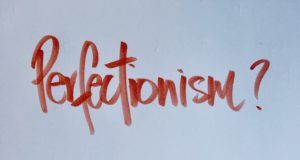 I think about perfectionism a lot. It’s the topic of the podcast I co-host with my friend and life coach Shannon Wilkinson every week. But lately I’ve been thinking about it particularly in relation to genealogy, since I’m working on my RootsTech talk next year, called “The Imperfect Genealogist.”
I think about perfectionism a lot. It’s the topic of the podcast I co-host with my friend and life coach Shannon Wilkinson every week. But lately I’ve been thinking about it particularly in relation to genealogy, since I’m working on my RootsTech talk next year, called “The Imperfect Genealogist.”
I have about ways perfectionism can cause genealogists to stall in their research. Here are a few examples:
- You don’t know how to do source citations correctly, so you don’t do them at all.
- You haven’t come up with the perfect way to organize your research, so you just keep doing research without organizing it.
- You don’t have a whole weekend to devote to your genealogy research, so you don’t do any
- You don’t know the very best way to preserve your archival documents, so you let them languish in an unsafe, non-archival environment (we discussed this very thing on Episode 20 of Getting to Good Enough.)
It’s your turn. You guys always provide such great insights I thought I’d ask you. Does perfectionism ever get in the way of your genealogy life? If so, please share what things you tend to get perfectionistic about and the impact it can have. (If you’ve figured out strategies for getting past that, I’m all ears!) Just leave a comment on this post. I’d sure appreciate your help. I’m sure you’ll contribute things I haven’t even thought of!
Edited to add: I wrote this post after I installed a new firewall on my site but before I learned that the firewall by default blocked comments! If you tried to comment, I apologize. It’s fixed now; please do try again!

Always on the quest for the perfect genealogy software program to use on my MAC.
Hesitant to create source citations, because of format errors or missing information.
Writing family stories, but I’m cautious about sharing them, Fear of criticism and naysayers.
Can’t find the perfect times for research, projects, organization, writing.
Thanks for commenting, Cheri. That quest for the “perfect” genealogy program is a tough one!I really appreciate your sharing your list! If there’s one thing I know to be true, it’s that an imperfect source citation is better than no source citation!
I have almost finished a piece I am writing about breaking a brick wall on the maternal side of my family. In it I included techniques that helped in the search and outcomes. I hope to share it with family with an RSVP to respond if they would like to know more. It’s taken several months to get it right–that perfection thing–which I got past by sitting and writing/revising most mornings with the understanding that time in the chair in front of the computer would lead to a final product eventually. In this long process, I uncovered more “evidence” to back up pertinent information making my research more credible. So maybe there was a serendipitus reason for me to take so long at this task!!!
Enjoy and learn lots from your posts. Thank you.
Thanks for sharing! At some point you have to call it done, right? Otherwise no one will ever see it. I hope you’re able to share this important document with your family soon! (And remember, you can always issue an update if you find more evidence.”)
Hi Janine,
We discussed this via email in August, but based on your blog topic and your encouragement to post my comments online, I thought I’d do so here.
First of all, I’m a long time blog follower, and I regularly listen to your and Shannon’s podcast. In Feb 2019, the topic of Zotero came up on your blog. I had been struggling with settling on a research log and To Do List system, so decided to buy the Zotero book, download the free software, and give it a try.
I never got to the point where I embraced using Zotero. It’s a great tool, but it was too complex a solution for me, and there was an internal resistance to the tool. I have a quote from David Allen on my desk: “Keep your system as simple as possible, but no simpler.” It applies here. Comments from your GTGE podcast also apply! The search for a perfect solution was getting in the way of adopting a workable solution and then adjusting course as needed.
So, what I do at present is the following. I started a hand-written research journal in which I enter a brief recap of daily activities. There’s something about writing it down that is healthy for me. I maintain an Excel log for AncestryDNA kit contacts until a relationship is confirmed and the person is in my tree. I adopted Crista Cowan’s use of custom groups in AncestryDNA, and it’s made a huge difference. For specific research projects, I use a Word document per project, modeled after the template from The Golden Egg Genealogist (who also wrote the Zotero book). And for To Do’s and follow ups, I use David Allen’s ‘Getting Things Done’ solution within Outlook, which is the system I’ve used for a few years for the rest of my life–projects, next actions , follow-ups, waiting-for-reply emails, and the like. It just made sense for me to use my GTD system for genealogy also.
Thanks for your blog!